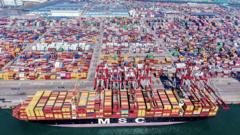The changes to the de minimis exception under Trump's tariff provisions may significantly affect e-commerce import costs, particularly for popular platforms like Shein and Amazon. Critics warn this could enable drug trafficking due to reduced oversight.
New Tariffs Impact U.S. E-Commerce Landscape Following Trump's Executive Order

New Tariffs Impact U.S. E-Commerce Landscape Following Trump's Executive Order
President Trump's recent tariff measures could lead to higher costs for numerous online goods by altering existing trade rules.
President Trump’s recent executive order imposing substantial tariffs on Canada, Mexico, and China has introduced a pivotal shift in how online purchases will be taxed, potentially increasing costs for many consumers in the U.S. The new measures particularly target the expansion of online sales platforms such as Shein and Temu, which have gained popularity for selling low-cost goods to American shoppers.
A striking aspect of the order is the removal of the de minimis exception, a provision that has allowed over 80% of e-commerce imports to bypass tariffs if they remained under a threshold of $800 per recipient per day. This exemption has been systematically utilized by companies to facilitate their operations without incurring additional costs related to tariffs, all while sending products directly to consumers.
The ramifications of this policy change will doubtlessly shift business dynamics, potentially leading many retailers to raise prices to cover new tariffs. Giants like Amazon, Shein, and Temu, which thrived under the old rules, may find their competitive edge diminished. In a landscape where low-priced goods appeal to budget-conscious shoppers, such changes could alter shopping behavior and decrease the attractiveness of imported goods.
However, the de minimis rule has come under fire for enabling a rise in drug trafficking within the U.S. Critics argue that the reduced scrutiny of packages has made it easier for illicit substances and related chemicals to enter the country without detection. The original intent behind the de minimis provision was to exempt trivial shipments from customs attention, a century-old rule that has transformed but has now drawn complex criticism.
As the situation unfolds, stakeholders in trade, e-commerce, and public safety will closely monitor how these tariffs influence pricing and compliance in the digital marketplace. The potential for increased regulatory scrutiny and the balancing act of consumer costs versus security measures will define this evolving narrative.





















